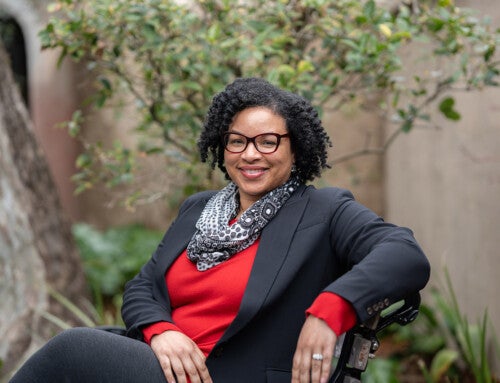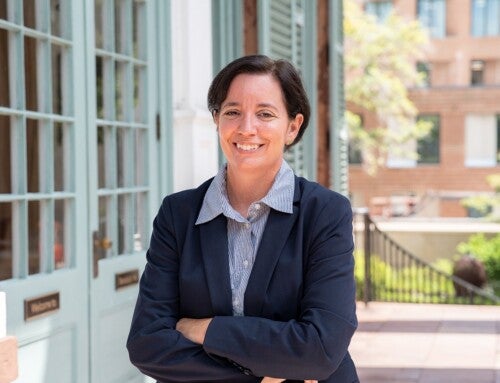As part of the College’s membership with the National Center for Faculty Development and Diversity, the first cohort of College of Charleston faculty completed their 12-week Faculty Success Program. The faculty members immersed themselves in an intensive boot camp to increase research and writing productivity while maintaining a healthy work-life balance. Through the online program, they had the opportunity to network with a community of faculty, postdocs and graduate students from more than 450 colleges and universities.
“The NCFDD Faculty Success Program is a valuable resource for faculty development,” says Margaret Hagood ’92, Center for Excellence in Teaching and Learning director and professor of teacher education. “Participants have the opportunity to network and learn important tools to thrive within the university environment.”
RELATED: Read more about how the College’s NCFDD membership promotes and supports faculty.
Yu Gong, assistant professor of physics, joined the Faculty Success Program to learn how faculty from different higher institutions organize their time and write manuscripts and grants.
“NCFDD shared a lot of useful strategies to help us make writing and time organization more efficient,” Gong says. “For example, setting the bar a little lower than your initial expectation and progressing little by little to reach the final goal with stronger confidence. It is a good practice to apply in both teaching and research. Each completed small step will make you feel achievement and push you closer to the ultimate target.”
Julia M. Arroyo, assistant professor of sociology, participated in the program with an eye toward learning strategies, building habits and practicing ways of thinking to help improve writing productivity without sacrificing personal wellbeing. Her desire stemmed from having to juggle writing and research with raising two young children. Through the program, Arroyo met other faculty in a similar situation who were also setting unrealistic but hopeful goals.
“After hearing that I was not alone in this and working together to set up positive feedback loops, I am better able to see and celebrate the progress I can and do make, daily and in the long term,” she says, adding that one of the most valuable aspects of the program is the sense of community the weekly check-ins with her group provided, especially in summer. “Through FSP, I learned that – although my time is finite – I can have enough time to write and live without sacrificing teaching. I have learned strategies, such as identifying and questioning self-limiting thoughts and building in ‘buffer time’ when self-imposing deadlines, that will help me reduce stress and work more effectively as I respond to competing demands I experience.
“I also learned ways to build my professional network and trusted that I could be open with my group and ask ‘stupid questions,’ which I think is especially important for faculty who are first-generation college students, people of color or graduates from non-elite academic programs,” she adds. “A few times this summer, I had an ‘aha’ moment when my coach or a group member suggested a solution to something I hadn’t realized was a problem.”
During the program Arroyo also submitted two conference proposals, both of which were accepted. She revised a manuscript and is submitting it for peer review. She also identified a collaborator for another manuscript and began preparations to submit a conference proposal in late fall.
Chris Mothorpe, associate professor and chair of economics, joined the program to look at his career from a strategic perspective. He wanted to gain strategies on how to manage his work-life balance and get promoted to full professor.
“A big component of being considered for promotion is getting five peer-reviewed journal articles accepted – a very time-consuming effort,” says Mothorpe, noting how the program helped him with weekly planning, establishing a better mentor group network and creating a strategic plan and end goal.
To achieve his goal of producing peer-reviewed articles, Mothorpe blocked 30 minutes each day for writing. He also follows a system he learned where he sets his schedule for the week and does not deviate. If someone wants an appointment and he’s unavailable, Mothorpe schedules it for the following week.
With mentoring, Mothorpe discovered that instead of one mentor, multiple mentors focused on specific areas of leadership is better.
“I have been able to establish a strong mentor group network now that I realize one mentor does not have to cover everything,” he says, noting that, for his strategic plan, he was inspired when he visited with Tracey Hunter-Doniger, associate professor and chair of the Department of Teacher Education. “Tracey has a map of the Appalachian Trail up in her office. She and I have both hiked portions of the trail, and the approximately 2,200-mile map made me realize that the trail is a great way to track my progress. I am now ‘virtually’ hiking the trail with 30 minutes of writing equaling 4.5 miles on the trail.”
Mothorpe has started in the south and has already virtually hiked into North Carolina.
“I am encouraged by the impact NCFDD is already making at the College,” says Suzanne Austin, executive vice president for academic affairs and provost. “Our faculty are reaching new heights both professionally and personally with the support of CETL and NCFDD.”
In partnership with CETL, the academic deans and the Office of the Provost, the below 12 faculty members were selected to participate in the 2023 summer Faculty Success Program:
- Julia M. Arroyo, Assistant Professor, Department of Anthropology and Sociology
- Nakeisha Nicole Daniel, Assistant Professor, Department of Theatre and Dance
- Yu Gong, Assistant Professor, Department of Physics and Astronomy
- Margaret Keneman, Assistant Professor, Department of French, Francophone, and Italian Studies
- Hyokyung Kwak, Assistant Professor, Department of Political Science
- Brian Lanahan, Associate Professor, Department of Teacher Education
- Chris Mothorpe, Associate Professor and Department Chair, Department of Economics
- Gretchen Scronce, Research and Instruction Librarian and Virtual Service Coordinator, CofC Libraries
- John Sieverdes, Assistant Professor, Department of Health and Human Performance
- Rafael Teixeira, Assistant Professor, Department of Supply Chain and Information Management
- John Thomas III, Assistant Professor, Department of Political Science
- Kimberly Jane Tribou, Assistant Professor, Department of Accounting and Business Law







